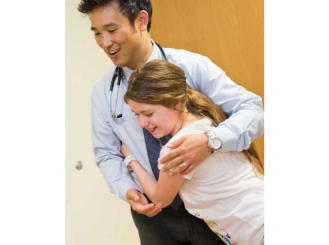Nov 13, 2018
As part of ASCO’s “I Live to Conquer CancerTM” Campaign to raise awareness of the critical importance of federally funded cancer research, members of the oncology community are invited to answer the question “Why do you live to conquer cancer?” Written stories and videos may be shared on ASCO.org and ASCO Connection. Tell us your story today.
By Eugene Hwang, MD
I am a pediatric neuro-oncologist at the Children's National Medical Center who cares for children with brain tumors. When others hear what that work involves, their first response tends to be pretty standard, some variation on “How do you do that? I could never do that.” It’s a comment that used to trigger immediate introspection… why would one choose to be involved in a career working with families dealing with pain and struggle? Why do I, particularly, live to conquer cancer?
When I meet a child with a new diagnosis of cancer, there is always a first moment in meeting the family when that nebulous fear of "wrongness" abruptly crystallizes into a single word: cancer. It is in that instant that every family reacts the same way: with slow comprehension, with unreasonable guilt and questions, and over it all, with a desperate fear that the most precious thing in the world might be taken away from them. Suddenly, the workplace issues and home arguments, the myriad small and large issues which seem so important, the business of day-to-day life all fall away. This is the moment that I start the journey, side by side with each child. It’s a time of perfect clarity: there is a cancer that we must beat, at all costs.
But, there are many children with cancer that we do not cure. Those who are cured endure chemotherapy and surgeries and radiation, complications and side effects, constant time in or at the hospital and away from normal life. Their diagnoses ripple out to affect family and schools and communities. I have attended end-of-treatment parties where I finally see the true breadth of the threads that tie all of us together; I have spoken at standing room-only funerals where sorrow and remembrance permeate because of the loss of a child, decades too early.
And, at every step of the way, I am continually reminded of why I cannot stop working in this field. I am honored and grateful that I have the chance to meet these tiny (and not-so-tiny) warriors, that each family pulls me into the inner sanctum of their loved ones, and that in some small way, I can provide hope for every child. While sometimes sorrowful, I am constantly inspired by these children, by their siblings and parents and family, by their friends and communities and strangers. And, I will continue to partner with these and others to work for a cure for children with brain tumors.

